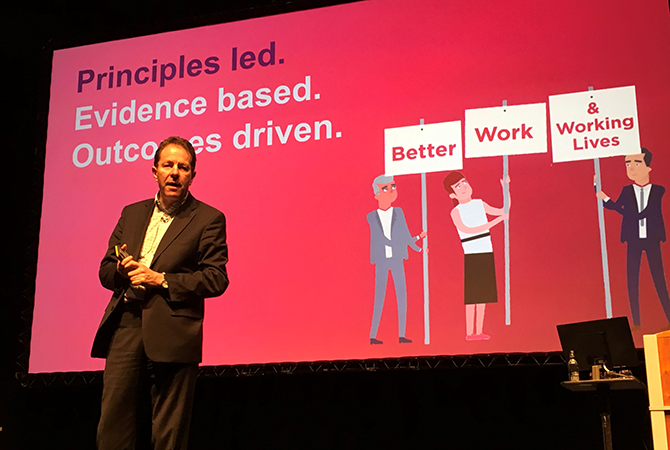Work is a fundamental part of life, consuming a large proportion of our time, but it’s also responsible for much anxiety and illness, as indeed is its absence. Building well workplaces is both a challenge and an opportunity; looking after people - both physically and mentally - benefits society and can mitigate some of the costs and consequences that adversely affect organisations, such as sickness and disengagement.
On 2 March, the CIPD welcomed over 500 members of the Scottish HR community to its 2017 Conference - supported by headline sponsor NHS Scotland - at Edinburgh's International Conference Centre. Professor Sir Cary Cooper, the CIPD's President and Peter Cheese, CIPD Chief Executive set the theme for the day by opening with a focus on the established link between employee well-being and productivity.

In his speech, Peter Cheese laid down a challenge for HR to be principles-led, evidence-based and outcomes-driven, and he outlined how the CIPD is transforming itself to support this new vision for the future.
Professor Sir Cary Cooper revealed that while stress and poor mental health are having a major impact on productivity, this is largely being ignored. He enthused delegates to understand more about what drives well workplaces in order to make a difference.
Organisations operating across and beyond Scotland went on to explore the core issues of well-being, engagement, resilience and leadership - the building blocks of strong businesses and healthy workforces. Leading employers provided practical examples of empowering managers to lead, create and maintain a positive culture that drives engagement. Other standout topics that emerged over the course of the day included:
- creating inclusive workplaces to develop resilience
- the impact of the McGurk Effect on perception
- the changing employment law landscape.
Professor Shane O’Mara, from Trinity College Dublin, concluded the Conference with a masterclass on evidence-based and human insight into how brain structure drives workplace behaviour. He explained that although the brain can age and change, it retains the capacity to adapt, and looking after our brains is an essential part of looking after ourselves. Premature retirement has been proven to lead to reduced cognition and to help our brains flourish, we need to exercise both physically and mentally.
John McGurk, the CIPD’s Head of Scotland and Northern Ireland, commented:
'Professor Shane O'Mara's closing session sent us all away with a spring in our step and a resolve to move more, sleep better and keep learning.'
The report launched at the Conference - Working Well in Scotland: Three pillars for a flourishing workplace - calls for HR and L&D professionals to support line managers and encourage leaders to build resilience and agility in the face of major challenges at work and beyond. A particular focus is needed on supporting mental health, given its increasing prevalence as a common cause of work-related incapacity. Professor Ewan McDonald of Glasgow University, who leads the Healthy Working Lives Group comments: ‘If you look at what keeps people off work and out of work, it’s quite often mental ill health, and if you look at what makes them physically ill, it often originates in mental illness, and that can originate in what’s going on at work, home and the community. Most of the work-based mental illness isn’t acute; it is generally issues like anxiety and mild depression. We can tackle it.’ (Speaking at Head Torch ‘Works Mental’ seminar, Glasgow, 19 January 2017.)
Top recommendations from the CIPD’s new report include:
- putting well-being at the heart of any people policy based on enhancing productivity
- developing small and focused interventions
- incentivising employees with fun interventions to help them become and stay fit and well
- auditing leaders for ‘leading well’ factors, such as: supportive challenge, engaging and connecting and leading human.






